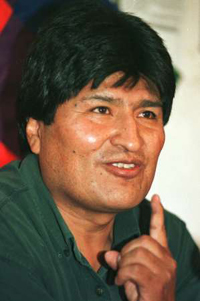EU-Latin America summit: European eyes on Chavez, Morales
European concerns over the treatment of foreign energy companies in Venezuela and Bolivia seem set to dominate this week's summit of 58 EU, Latin American and Caribbean leaders amid fears that spreading protectionism could disrupt efforts to strengthen economic and political ties.

The decision by Bolivian President Evo Morales to assert state control over his country's natural gas sector this month sent shockwaves across the European Union.
EU officials and diplomats said energy security would be a top issue at the three-day summit talks, which kick off Thursday with foreign ministers' talks and an informal leaders' dinner hosted by Austrian Chancellor Wolfgang Schuessel, summit chair and current EU president.
Draft summit conclusions obtained by The Associated Press stress the "sovereign right of the countries to manage and regulate their natural resources." They add that the European and Latin American nations agree to "continue and strengthen ... cooperation with a view to establishing a balanced trade framework."
The wording, yet to be finalized, will be keenly watched by oil companies including the Spanish-Argentine Repsoil YPF, Britain's BP PLC and France's Total SA, which are facing problems in Bolivia after Morales gave foreign companies six months to negotiate new contracts or leave.
Bolivia has South America's second-largest natural gas reserves after Venezuela.
Venezuelan President Hugo Chavez, an ally of Morales, announced last weekend he would introduce a new tax targeting foreign oil companies in a fresh effort to seek a larger share of rising energy revenues. Foreign companies there already pay a royalty fee for extracting heavy crude, reports the AP.
I.L.
Subscribe to Pravda.Ru Telegram channel, Facebook, RSS!


